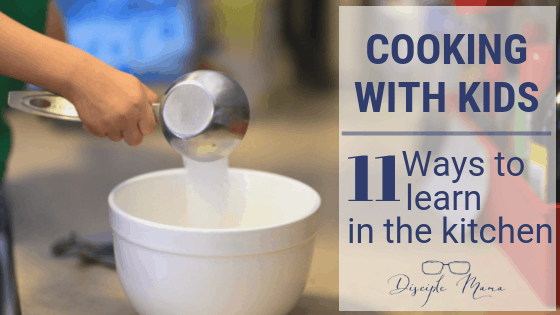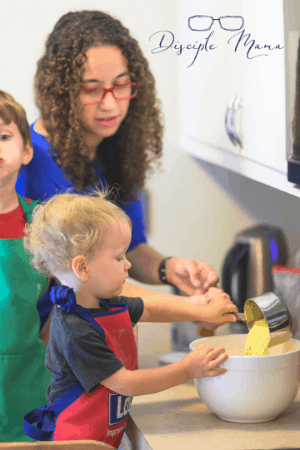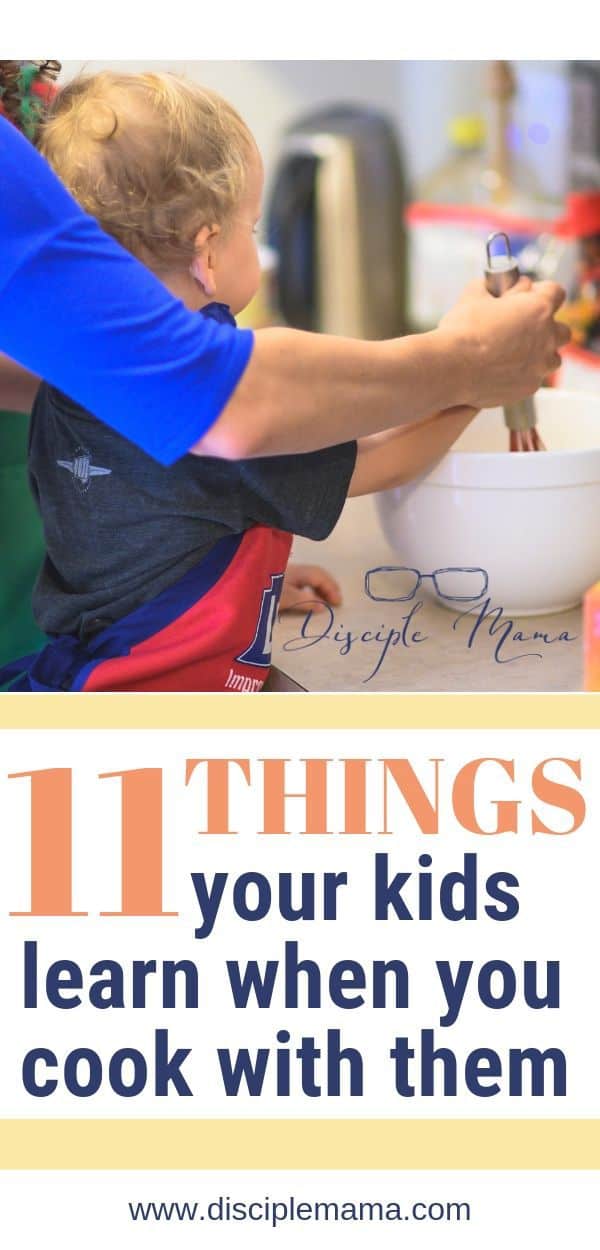Cooking with Kids: 11 Ways to Learn in the Kitchen

Meals are important in our house. When we’re home, we eat all of our meals at the table as a family, and we try to often invite others to share meals with us, too. All of those meals mean that we spend a lot of time cooking with our kids.
Cooking is one of those things that I LOVE doing…sometimes. I like cooking when my house is super clean, there’s no pressure, and I have plenty of time. This is pretty much never the case (because kids and life), so either I don’t cook or I grit my teeth and pour love into my family’s meals anyway.
Thankfully, my husband loves cooking (and is good at it). So we share the responsibility.
But, we believe that our kids need to learn to cook, too.
This post contains affiliate links, and as an Amazon Associate I earn from qualifying purchases. I only recommend products I have used and enjoyed, unless otherwise specifically stated.
Ellen White wrote, in Child Guidance, “Do not neglect to teach your children how to cook. In so doing, you impart to them principles which they must have in their religious education. In giving your children lessons in physiology, and teaching them how to cook with simplicity and yet with skill, you are laying the foundation for the most useful branches of education.”
Because my husband and I believe that family meals and nutritious food support our family’s core values, and because so. much. time. is spent in the kitchen making food every day, we have gotten our kids involved in cooking from a very early age. An added bonus? They’re happily screen-free, and not underfoot and asking to be entertained when we’re trying to make dinner, because they’re at the counter helping us!
Keep reading to check out many more reasons why it’s good to teach your kids to cook!
What can children learn from cooking?
Cooking with kids is a lot of work as well as a lot of fun. But, other than the obvious–teaching them to make food for themselves (and YOU!)–what can children learn from cooking?
Actually, they can learn a whole bunch!
For the Cliff’s Notes version, here’s a video I made for the super cool Smarter This Summer program from Learning Success!
1. Cooking helps kids learn to follow directions.
Even if they don’t know how to read the recipe on their own yet, kids will learn the idea of adding all the ingredients and following all the steps. To really build this skill, you can talk them through the reasons why you do certain things (like mixing all the dry ingredients together and then add them to all the wet ingredients, or packing the brown sugar when you measure it), and what would happen if you didn’t. Your kids will start to get a feel for the importance of precision and how much wiggle room there is (or isn’t) for free styling.
2. Cooking with kids helps them learn measurement skills.
Just by helping you measure out ingredients, even very young kids will become aware of different units of measure (cup vs. teaspoon). They will also learn that just using the correct measure isn’t enough, but it needs to be full and level (not partially filled or heaped over) in order to be properly measured.
3. Cooking helps children develop motor skills.
Adding a pinch of salt, shaking the cinnamon shaker (just once!), pouring out a ladleful of pancake batter onto the griddle, and pinching the edge of a pizza crust will all help develop fine motor skills. Want to work on gross motor? Stirring a pot of soup, kneading bread dough, carrying ingredients from the pantry to the workspace, and even climbing up and down to reach the countertop or sink are all ways that cooking can help!
4. Kids learn to appreciate food when they cook.
 My kids aren’t very picky, but in the times that they do decide to be fussy about food, it’s a lot easier to talk them into trying something new if they have helped to prepare it! It’s tough for kids to resist the urge to try the food that they work hard on, so have them help with all the veggies! According to a 2017 survey, most kids aren’t getting nearly as many vegetables as they should, and increasing their exposure to these healthy foods makes them more likely to consume more vegetables. There are definitely foods my kids don’t like to eat, but both of them are fairly adventurous eaters and they’ll usually at least give anything a try (as long as it’s vegetarian–E is very careful to ask about that!).
My kids aren’t very picky, but in the times that they do decide to be fussy about food, it’s a lot easier to talk them into trying something new if they have helped to prepare it! It’s tough for kids to resist the urge to try the food that they work hard on, so have them help with all the veggies! According to a 2017 survey, most kids aren’t getting nearly as many vegetables as they should, and increasing their exposure to these healthy foods makes them more likely to consume more vegetables. There are definitely foods my kids don’t like to eat, but both of them are fairly adventurous eaters and they’ll usually at least give anything a try (as long as it’s vegetarian–E is very careful to ask about that!).
Even better, kids who work on cooking with their parents or other caregivers learn that making a meal takes time and energy. They learn that it’s rewarding work, but it really is work! My preschooler’s understanding of this has come in handy a few times when he’s melted down and said something less than flattering about a meal that was prepared for him. We can ask him how he would feel if he’d made something for us and we said, “that’s yucky!” and refused to eat it. He knows it would feel pretty rotten, and always (at least so far!) repents of his insults and eats the food gratefully after that little conversation.
5. Cooking helps children become more knowledgeable about food.
One of the things we want to develop in our children is a deep appreciation for the way God has provided an amazing variety of delicious and healthy foods for us to eat. Because they cook with us a lot, my kids can identify a lot of ingredients by sight, smell, and taste. They recognize many fruits and veggies in their whole forms, and they are familiar with many different ways of processing food. All of these things are important, because, to set a good foundation for learning nutrition, we want our kids to have a good idea of what their food started out like, and how it has been changed.
Now, please don’t get the idea that we use only whole foods and we process them all from scratch. That’s not what I’m claiming, though I will be the first to give you a high five if that’s what you’re doing in your kitchen.
My kids know that all-purpose flour is made from wheat, but they probably don’t have a great idea of what wheat actually is. We don’t make our own pasta, and on, and on. But I do try to tell them where things come from–like cheese is made from cow’s milk, or almonds grow on trees, and tofu is made of soybeans, etc. We also try to use fresh veggies a lot of the time so that they know what a head of cabbage or broccoli looks like, they know how to separate and peel garlic cloves, and they can recognize food as they see it in the produce section, and have an idea of what it looks like inside and out.
6. Cooking teaches kids to be mindful of their surroundings.
My kids are still quite young (2 and almost 4), so we don’t have them doing knife work or deep frying anything. But we do have them stir things on the stove sometimes, and they work near the waffle iron as it’s heating up, etc. They have to be careful about where they put their hands and how they move in the kitchen.
We supervise them closely, of course, and remind them if they get too close, or if they’re being silly and not paying attention, but they actually handle the responsibility of being respectful of the heat or sharp utensils, etc. very well. Cooking gives them an opportunity to take on a little bit more real personal responsibility and they step up to meet our high expectations.
Note–We haven’t gotten it yet, but I’m planning on buying this Curious Chef plastic knife for my son’s upcoming 4th birthday. I’m excited about giving him a safe way to help me cut up fruits and veggies!
7. Cooking helps kids participate cheerfully in family chores.
 Cooking, whether or not you enjoy it, is work, and the whole family benefits from it. Therefore, it makes sense that the whole family should participate in the duties that arise from cooking. Kids can (and usually will) joyfully help out when they are taught how to do so from a young age, especially when it’s clear that everyone is sharing the responsibility. It’s fun to cook for your family when your family is cooking with you! It’s a great way to teach our kids to put the instructions in Colossians 3:23 into practice!
Cooking, whether or not you enjoy it, is work, and the whole family benefits from it. Therefore, it makes sense that the whole family should participate in the duties that arise from cooking. Kids can (and usually will) joyfully help out when they are taught how to do so from a young age, especially when it’s clear that everyone is sharing the responsibility. It’s fun to cook for your family when your family is cooking with you! It’s a great way to teach our kids to put the instructions in Colossians 3:23 into practice!
Here’s what school-age children can learn from cooking:
Of course, they also learn all of the above lessons, but cooking can get downright academic when you’re working with older kids.
This summer, I participated in a project called “Smarter this Summer” which offers tips to parents for helping their school-age kids keep learning during the summer months and avoid the “summer slide.” The idea was to provide suggestions that pack an educational punch, but don’t feel like homework or school.
Well, my teacher brain settled almost instantly on cooking with kids as an awesome way to teach/review skills without making it feel like academic drudgery. Guys, I used to do this with my 5th and 6th graders, and you’d better believe they never complained about the math I was teaching them while they were making cookies. Yep, math. And that’s not all you can teach!
Here are a few things you can teach your older kids while you cook with them:
8. Cooking is a great way for kids to learn to work with fractions.
Guys, there are so many fractions in cooking, and they’re not that intimidating because you have measuring cups and spoons with the fractions labeled right on them. So, just talk a bit about the fractions! Is your one cup measure dirty? Have your child help you figure out how to measure out the right amount of flour using the 1/3 cup measure instead!
Need something more advanced? Have your child double the recipe (you can help as needed).
Want to really step it up? Halve the recipe or divide it by three.
For a really tough challenge, choose one ingredient from the recipe and set the amount. Then work with your child to figure out the measurements for all the other ingredients in proportion to that one! –For example, your favorite cookie recipe may call for 4 cups of flour, but maybe you only have 3 left. The challenge would be to bake as many cookies as you can with those 3 cups of flour. You get the idea.
9. Cooking is a great way to teach basic chemistry to kids.
Cooking is chemistry. One great (simple) concept you can demonstrate while cooking is physical changes vs. chemical reactions. For example, putting water (liquid) on to boil creates steam (gas), which condenses on the lid of the pot, and becomes liquid once again. Those are physical changes, because water is always water, whether it’s liquid or gas. But, mix up some pancake batter and throw that on the griddle, and then ask your child to cool off the pancake and turn it back in to batter. They won’t be able to do that, of course, because a chemical reaction has taken place. They can see it, feel it, and smell it!
Chemistry is everywhere in cooking, so I’m not going to go crazy with examples, but consider making cheese or baking bread from scratch to demonstrate some great chemical reactions.
10. Cooking is a great way to sneak in some reading practice.
Something as simple as reading through the recipe can be great practice for kids who are struggling with reading or reading comprehension. Check out this post by literacy teacher Jill Eisenberg for more information!
11. Teaching kids to cook helps them learn to plan ahead.
One skill that’s often overlooked at school and at home is teaching our kids how to visualize a process in its entirety and plan ahead for it. Cooking, or really, just reading the recipes through is fantastic practice for this! Make a point of reading through all the directions before beginning to make sure you understand the whole process and have everything in order (mise en place) when you start cooking. This is a valuable life skill on so many levels, and this simple activity will help teach your child that reading through once carefully will save you time and effort in the long run, rather than reading the recipe one line at a time, and running into problems. (We’ve all done that before, right?!)
Get into the kitchen and start teaching your kids how to cook!
Involving your kids as you work in your kitchen is a lot of work, but it is worthy and noble work that will pay off in the end. You’ve got to make dinner anyway, so why not spend some quality time with your kids that will really help them learn valuable skills?
Do you cook with your children? I’d love to hear how you make it work!
Did you enjoy this post? Share it!
Want to keep reading? You’ll enjoy these posts, too:
Easy Games for Kids and Why You Should Play
Outdoor Play for Toddlers: 5 Amazing Benefits You’ve Never Heard Before
Practical Resources for Going Screen-Free



I love, love, LOVE this post! When I was on maternity leave, I tried to get our boys involved in some of the cooking and a few “experiments”. Our oldest just turned three and our middle is 1.5 so they can only help so much physically, but we also seat them at the island’s bar during meal preps so they feel involved. I try to narrate what I am doing, too. I admit that I do not do this as often as I would like, but I think it will get a tad easier as they get a bit older and can help more.
The narration is so helpful, too! They’re learning AND they are entertained, which makes a mama’s life so much easier! As they get older it gets easier, for sure! Mine are only a little older than yours, and it’s getting easier by the day!
You are so, so right! I got my daughter in the kitchen early on, and by the time she was 9, she could cook a full course meal…breakfast or dinner, with some variety. It’s always been one of the things I felt most strongly that I did right in parenting! LOL! But I never even thought about some of these added benefits! Great article. Thanks for sharing!
Wow, 9 and cooking a full course meal?! That’s so wonderful and so encouraging for mamas who are cooking with their tiny little ones! Thank you so much for stopping by and sharing!